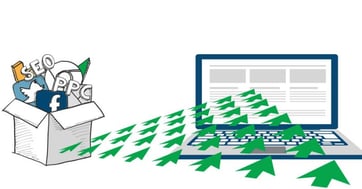Which B2B advertising platforms are you using for marketing? Are you frustrated because digital advertising is expensive, and you are not seeing results as quickly as you hoped? We know the business-to-business (B2B) buying journey is long as more people are involved in purchase decisions. Clients also want the products or services they buy to offer long-term solutions, a return on investment (ROI), efficiency, and expertise.
Why Does My B2B Business Need a Digital Strategy?
Because B2B is all about building a long-term relationship, companies want to know who they are doing business with and that the service provider is trustworthy. Are you sharing your brand personality on digital platforms while offering thought leadership and information highlighting your expertise? It might make all the difference while you continue to target your prospects at every stage of the purchasing journey. Sharing valuable information that highlights your expertise not only positions you as a trusted authority but also helps educate and engage your target audience.
When it comes to targeting prospects at every stage of the purchasing journey, personalization is key. Tailoring your messaging and content to address the specific pain points and needs of your prospects can greatly impact their decision-making process. By providing relevant and valuable information, you can establish yourself as a reliable source of solutions and build lasting relationships with potential customers.
Furthermore, leveraging digital platforms that are filled with your B2B prospects allows you to reach a wider audience and engage with them on a more personal level. Through social media, blog posts, and other content channels, you can showcase your brand personality, share industry insights, and provide valuable resources that address the challenges faced by your target audience. This not only helps build trust but also positions your business as a thought leader in your industry.
Is it time to see how you can improve your current advertisements or try another digital advertising platform? We discuss the top three platforms for your B2B advertising.
Best B2B Advertising Platforms for Your Brand
B2B Option #1: Google
Since business is all about numbers, we start with Google. Google holds 91.5% of the global search traffic share and 58% of the search advertising market share, while search advertising is projected to reach $251.1B USD in 2024.
Google may be the biggest digital advertising platform in size, but if your Google Ads results are not what you want, you should try the following:
- Negative keywords: Ensure you use all the negative keywords relevant to your business, products, or services to prevent unqualified clicks from wasting your budget.
- Customize landing pages: Never underestimate the importance of making sure your landing page matches your Google advertisement, even when advertising several products or services.
- Remarketing: The B2B sales cycle is long, so use remarketing to subtly remind your potential customers that you are still interested in doing business with them and that your business has the offering they need.
By implementing these tactics, B2B brands can optimize their presence on Google and effectively reach their target audience.
B2B Option #2: LinkedIn
LinkedIn is the world’s largest professional network and is ideal for lead generation for B2B businesses. 93% of B2B content marketers leverage LinkedIn for their organic social media marketing efforts, and 97% incorporate LinkedIn into their content marketing strategies. Are you harnessing the platform’s full potential for your B2B advertising?
Your LinkedIn company page is the pipeline for leads to click through to your website, so the header image and first two sentences should engage the potential client by putting their needs at the forefront. Create a Showcase Page for every single brand, business unit, or company initiative, as it allows you to build a long-term relationship with a specific audience.
Grow your network (and leads!) by joining a LinkedIn Group in your niche and maintain a level of activity to show your commitment. Don’t forget to publish content on LinkedIn as an individual and business. Quality content marketing services will boost your inbound traffic and complement your LinkedIn Ads’ outbound strategy.
With its focus on professionalism and networking, LinkedIn offers a unique opportunity for B2B brands to establish trust and showcase their expertise to their target audience. So, if you're looking for an effective digital advertising platform for your B2B marketing efforts, LinkedIn is definitely worth considering.
B2B Option #3: Facebook
Are you one of the 93% of small businesses that use Facebook as a marketing tool? Since 81.8% of all users access the platform via a mobile device only, your Facebook ad campaign must be optimized for mobile because this means that businesses can effectively reach their target audience even when they are on the go.
So what should you do?
Keep the copy short with the most important information in the first two lines of the ad text, and use vertical videos and images that can be expanded to full screen. Videos are a great way to immediately show potential B2B clients how your product, service, or business can fulfill a need, and the right call-to-action will generate leads. You can use a standard video for a sales piece or Facebook Live to connect with your existing B2B audience for a live product demonstration.
By leveraging Facebook's extensive reach, precise targeting options, and mobile-friendly features, B2B marketers can effectively promote their business and generate leads in a cost-effective manner.
Main B2B Marketing KPIs Your Campaign Needs to Track
When running a B2B marketing campaign, it is crucial to track key performance indicators (KPIs) to measure the success and effectiveness of your efforts. By monitoring these metrics, you can gain valuable insights into the performance of your campaign and make data-driven decisions to optimize your strategy. Here are the main KPIs that your B2B marketing campaign needs to track:
- Lead Generation: This KPI measures the number of leads generated through your marketing efforts. It includes metrics such as the number of form submissions, downloads, and inquiries. Tracking lead generation allows you to assess the success of your lead generation tactics and make adjustments if necessary.
- Conversion Rate: The conversion rate measures the percentage of leads that convert into customers. It is a critical KPI for evaluating the effectiveness of your sales funnel and identifying areas for improvement. By tracking the conversion rate, you can identify any bottlenecks in the customer journey and optimize your marketing and sales processes accordingly.
- Cost per Lead: This metric calculates the average cost of acquiring a lead. It helps you determine the efficiency of your marketing campaigns and compare the effectiveness of different channels or tactics. By tracking the cost per lead, you can allocate your budget more effectively and optimize your ROI.
- Customer Lifetime Value (CLV): CLV measures the total value a customer brings to your business over their lifetime as a customer. It takes into account factors such as the average purchase value, purchase frequency, and customer retention rate. Tracking CLV allows you to identify your most valuable customers and tailor your marketing efforts to maximize their lifetime value.
- Return on Investment (ROI): ROI measures the profitability of your marketing campaigns by comparing the revenue generated to the cost of the campaign. It is a crucial KPI for assessing the overall effectiveness and profitability of your marketing efforts. By tracking ROI, you can identify which campaigns or channels are delivering the best results and allocate your resources accordingly.
- Website Traffic and Engagement: Monitoring website traffic and engagement metrics, such as the number of visitors, time spent on site, and bounce rate, can provide insights into the effectiveness of your content and user experience. By analyzing these metrics, you can identify opportunities to optimize your website and improve user engagement.
- Social Media Engagement: If you are using social media platforms for B2B marketing, tracking metrics such as likes, comments, shares, and click-through rates can help you assess the engagement and effectiveness of your social media campaigns. It allows you to identify which content resonates with your target audience and refine your social media strategy.
Our Digital Marketing Agency is Here to Help
Do you want to improve your digital advertising results? Are you interested in adding another platform to your advertising strategy? Wherever you are on your journey, a WSI Certified Digital Marketing Consultant is ready to help!
Reach out today, and we will work together to improve your ROI from digital B2B advertising platforms.







